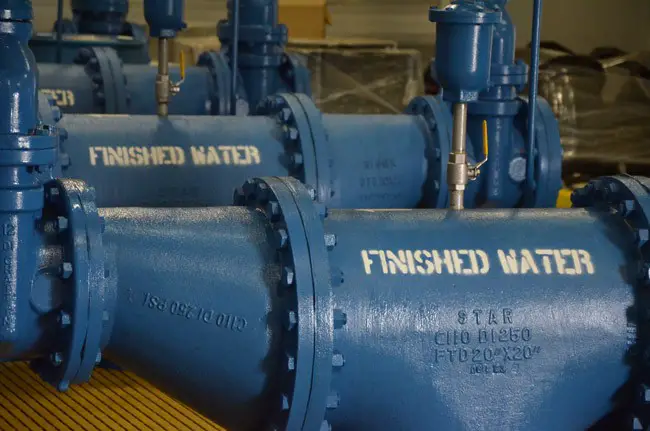
Just as it did three years ago, when Palm Coast refinanced the two massive bond issues that paid for the acquisition of and improvements to its water utility, the city is about to refinance yet another loan it took out in 2007 to pay for Water Treatment Plant No. 3 on U.S. 1. The refinancing is expected to save the city upwards of $500,000 a year, money it would keep in reserve for further capital improvements.
The Palm Coast City Council is holding a special meeting Tuesday morning, when it is expected to sign off on the deal. The nearly $600,000 in annual savings will not, however, lower utility rates.
The refinancing entails replacing the 2007 bond issue with a bank loan, at a lower, fixed interest for the duration of the loan’s 20-year life. The loan matures at the same time as the bonds would have: 2036. The local Ameris Bank is making this possible, after the city floated a request for proposal earlier this year.
The council briefly discussed the possibility of refinancing at a workshop in February. At the time, the city administration was not sure whether it would refinance with another bond or with a bank loan, but was clearly pushing the bank approach. Council members had little input.
The bond in question was issued in 2007 for $49.8 million, when the city was paying a 4.37 percent interest rate. The bonds were rated triple A at the time, by three rating agencies. But the city’s bond insurer’s rating was downgraded in 2010 to A-plus, which required the city to establish a debt reserve fund. (The city is hoping to be upgraded to AA soon, Finance Director Chris Quinn told the city council.)
Lower ratings make loans more expensive, at least in the bond market. The rating does not affect bank loans: that’s between the bank and the city. That’s why the city was favoring the bank approach. The cost of refinancing through a bank is also significantly less expensive than refinancing bonds.
The current balance on Palm Coast’s bond is $42.2 million, with interest rates fluctuating, according to the city’s last audit report, from 3.625 percent to 5 percent. In 2015, debt service (principal and interest) was $3.08 million. At the time, the combined principal and interest on the bond was $70 million.
Bond refinancing, according to Mark Galvin, director of First Southwest, a division of Hilltop Securities—the company providing financial advice to Palm Coast—said in February the city could refinance its bond and realize a projected saving of around $490,000 a year in debt service, or $3.6 million over the life of the loan in present-value dollars: that is, assuming all factors remain equal. Refinancing that way could cost half a million dollars, a cost that would be folded into the bond repayments.
“These are projected savings, just like of you start that whole process, you’re not able to lock in on the interest rate until further on down the road,” Galvin said, “which is probably about two months down the road, if you do a bond issue. If we do a bank loan we could probably lock it in even quicker.”
Netts thought a bank approach preferable. But, Galvin cautioned, “Traditionally banks don’t like to go out 20 years. They might give you 20 years amortization, but they’re going to want to balloon, or they’re going to say we want to reprice it, so they’re not locking in the interest rate.”
Galvin added: “Ninety percent of the banks won’t respond with a qualified bid. There might be one or two outlying banks that say you know what. We’re willing to go that way, we’re willing to take that additional risk. Different banks have different credit criteria, different structuring criteria, and it costs us nothing to ask.”
So they asked. Three banks responded, two provided a qualified bid, among them Ameris Bank, with Ameris Senior Vice President Garry Lubi, who has been working through such loans frequently with local governments (including Bunnell and the school board), working out the details.
The bank is offering the $41 million loan at a fixed 2.48 percent interest, for a closing cost of $25,000, and realizing the city an expected annual saving of close to $600,000, according to Hilltop Securities’ recommendation. The savings over the life of the bond are projected to be $12.5 million.
But don’t expect water rates to be lowered as a result.
“It’s not a good idea to put it into your operating fund,” City Manager Jim Landon said of the expected savings, “so it’ll be similar to a reserve fund, but reserve for capital expenditures, which is really what you usually have to have a rate increase for. This helps stabilize the rates long term.”





























Leave a Reply